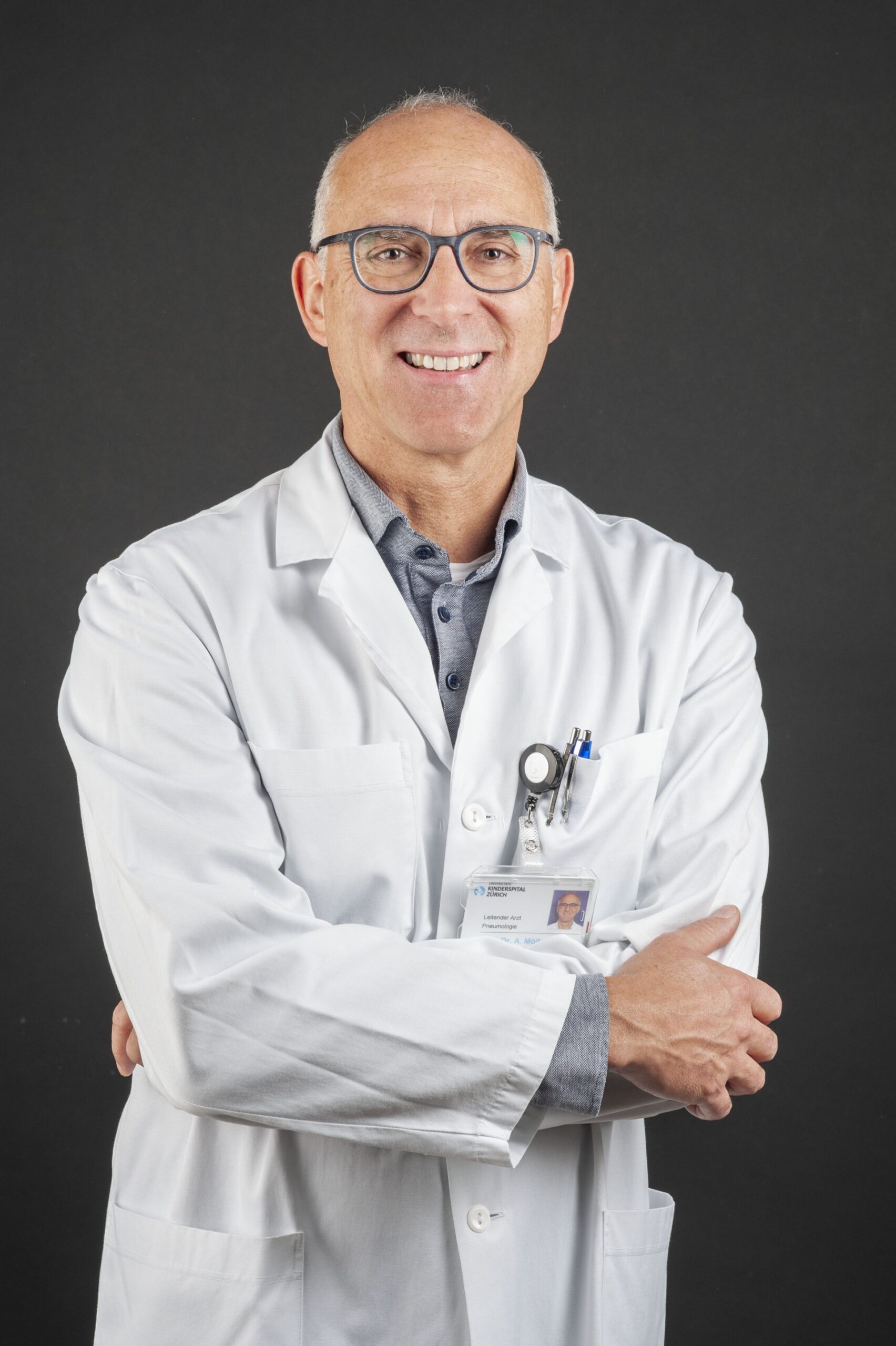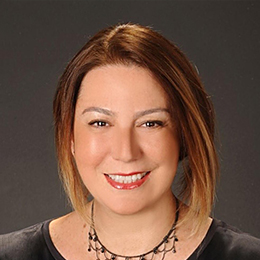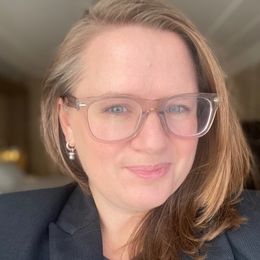
Prof. Dr Alexander Möller – Head of Assembly 7
Q: As Head of Assembly 7, what are you most looking forward to about this year’s ERS Congress?
What I look forward to the most is reconnecting with all the paediatric pulmonologists – long-time friends as well as young, enthusiastic colleagues. I especially value the high-level scientific exchange and the discussion of fascinating, complex clinical cases. I am also particularly excited about the Paediatric Forum, previously known as the Paediatric Half Day. The ERS Congress is, in my view, the best professional network there is.
Q: What in your opinion will be the hot topics for paediatrics?
The Paediatric Forum, consisting of three mini symposia, provides an excellent overview of some of the hottest topics in paediatric respiratory medicine. These range from congenital airway malformations to paediatric respiratory tract infections and the prevention of respiratory diseases in children – all highly relevant and important subjects. So don’t miss Saturday afternoon! The State of the Art session will feature four cutting-edge topics presented by outstanding international speakers. One key question to be explored is: Is asthma remission in children achievable? – discussed in the Year in Review. Meanwhile, the much-anticipated Lungs on Fire session will give the experts in the hot seat a hard time, but also actively involve the audience in solving challenging clinical cases. And that’s not all – the programme is packed with exciting sessions focusing on paediatric lung diseases and especially on translational science.
Q: Tell us your top three picks from the congress programme?
Beside the hot topics mentioned, there will be three very relevant symposia.
1. Symposium – Importance of the exposome in prevention and treatment of chronic lung diseases
Sunday 28 September, 08:30–10:00 CEST
This is a translational session from the EXPLAIN-IT (Exposome and prevention of lung diseases, an international interdisciplinary translational network) Clinical Research Collaboraton. The exposome plays an important role in the development of chronic lung diseases from early childhood to late adulthood. Understanding how the exposome affects lung health and normal lung development will help to set in place more effective prevention strategies potentially with a relevant political impact. Here, basic science meets clinics.
2. Hot topics – Challenges in environmental childhood respiratory health around the globe
Tuesday 30 September, 08:30–10:00 CEST
Air pollution and climate change are relevant threats to infants and children and their growing lungs. We have to ensure clean air for all children in the world and achieve environmental justice globally. To be able to achieve these high goals we need to understand the interplay between air pollution and extreme weather on childhood lung health, maybe with the help of artificial intelligence and big data. I personally believe this is a highly relevant symposium in our current time, where science is under attack by ignorance and political power.
3. Symposium– Rare respiratory diseases in children: from misknowledge to personalised medicine
Tuesday 30 September, 15:30–17:00 CEST
Paediatric pulmonology is a very broad field ranging from asthma, cystic fibrosis and chronic lung disease of prematurity, hence we as specialists need to know the borders of the very rare lung diseases in children. We also need to learn about novel therapeutic options with the ultimate aim of successful transition of the grown-ups with rare lung diseases.

Prof. Dr Refika Hamutcu Ersu – Secretary of Assembly 7
Q: As Secretary of Assembly 7, what are you most looking forward to about this year’s Congress?
I am looking forward to connecting with my colleagues from all over the world. This is the best part of in-person meetings. You reconnect with your colleagues who became your friends over the years and meet new ones from all over the world. You discuss your work, hear about their work, and make plans to work together towards a common goal: improve children’s respiratory health globally.
Q: What in your opinion will be the hot topics for paediatrics?
This year, the paediatric programme is again very exciting and paediatric respirologists will find a very interesting session to attend throughout the Congress. We will have the Paediatric Forum on Saturday 27 September. This half-day programme is great to keep your paediatric respiratory knowledge up to date. We will have the Lungs on Fire session, which is always a great way to test your knowledge while hearing about interesting case presentations. The paediatric State of Art session has four very interesting talks on hot topics including interventional bronchoscopy in children, asthma biologics, post-infectious bronchiolitis obliterans and phenotype-based treatment of prematurity associated respiratory disease. The Year in Review session also will bring you the latest information on disease modifying treatments in neuromuscular disorders, mycoplasma pneumonia, asthma remission, and use of artificial intelligence in clinic settings.
Q: Tell us your top three picks from the congress programme.
1. Hot topics – Challenges in environmental childhood respiratory health around the globe
Tuesday 30 September, 08:30–10:00 CEST
This session will discuss environmental hazards, with a focus on air pollution and climate change and their interplay in the context of global childhood respiratory health and will explore possible solutions.
2. Symposium – Global burden of neonatal and infants’ respiratory diseases
Tuesday 30 September, 13:45–15:15 CEST
This session is important as there are so many challenges that we need to overcome in reducing the global burden of respiratory disease and ensure equitable access to adequate care for neonates and young children with lung diseases. We will have a better understanding of these following this session.
3. Pro-Con debate – Should we use inhaled corticosteroids in children with bronchopulmonary dysplasia?
Monday 29 September, 11:05–11:50 CEST
Pro-con debates are always fun and a great way to learn about a controversial subject. This year’s paediatric pro-con debate has a great question: “Should we use inhaled corticosteroids in children with bronchopulmonary dysplasia?” Let’s make our decision after hearing the experts discuss their points!

Dr Susanne J. H. Vijverberg – Early Career Member (ECM) Representative of Assembly 7
Q: As ECM Representative of Assembly 7, what are you most looking forward to about this year’s ERS Congress?
This year’s Congress is special for me since it takes place in Amsterdam, the city where I am based as a respiratory researcher at the Amsterdam University Medical Center. So it is a privilege to welcome international colleagues in a city not only famous for its historical canals, charming narrow houses, bikes (watch out!), world-class art but also for its irresistible stroopwafels (don’t forget to try one)! I am really looking forward to attend sessions about the latest developments in the respiratory field and to interact with people from all over the world. The annual Congress is always a source of inspiration and valuable new connections.
Q: In your opinion, what will be the highlights for ECMs in Assembly 7 during the ERS Congress?
There is so much to explore and it can be overwhelming. I encourage ECMs to plan ahead and pick sessions that spark their curiosity. For ECMs especially, the poster sessions are a great opportunity to interact and network. I also strongly recommend to attend the ECM session on Monday 29 September 29 (15:45-17.00) and the Science Slam on Tuesday 30 September (15:45-17:00). Both are fantastic chances to connect with peers and the ECM Board members.
Q: Tell us your top three picks from the congress programme.
1. Forum – Paediatric
Saturday 27 September, 14:00–15:00 CEST (Part 1)
Saturday 27 September, 15:15–16:15 CEST (Part 2)
Saturday 27 September, 16:30–17:30 CEST (Part 3)
Following last year’s success, Assembly 7 proudly hosts the second edition of the Paediatric Forum. It was a huge success last year, and I am really looking forward to this year’s edition. It is a unique opportunity to gain an overview on the latest developments in the paediatric respiratory field. This afternoon is packed with interesting talks and brings together healthcare providers and researchers from various backgrounds. It will include talks on congenital airway malformations, respiratory infections and primary prevention, such as the vaping pandemic (and what to do about it) and how to prevent obesity-related respiratory disease. I expect lively discussions and inspiring ideas that can shape future paediatric care!
2. Hot topics – Challenges in environmental childhood respiratory health around the globe
Tuesday 30 September, 08:30–10:00 CEST
With air pollution rising, this session tackles one of the most urgent topics of our time: how pollution and climate change impact children’s respiratory health. A great session to learn about global disparities and how to be an advocate for clean air.
3. Hot topics – The many facets of transition care
Tuesday 30 September, 10:15–11:45 CEST
Transitioning from paediatric to adult care can be a challenging time for young patients. This session delves into psychological, clinical and practical aspects of supporting adolescents with respiratory diseases. Highly recommended for all clinicians and allied professionals working with adolescents and young adults.

 ERS Respiratory Channel
ERS Respiratory Channel
 ERS Respiratory Channel
ERS Respiratory Channel





